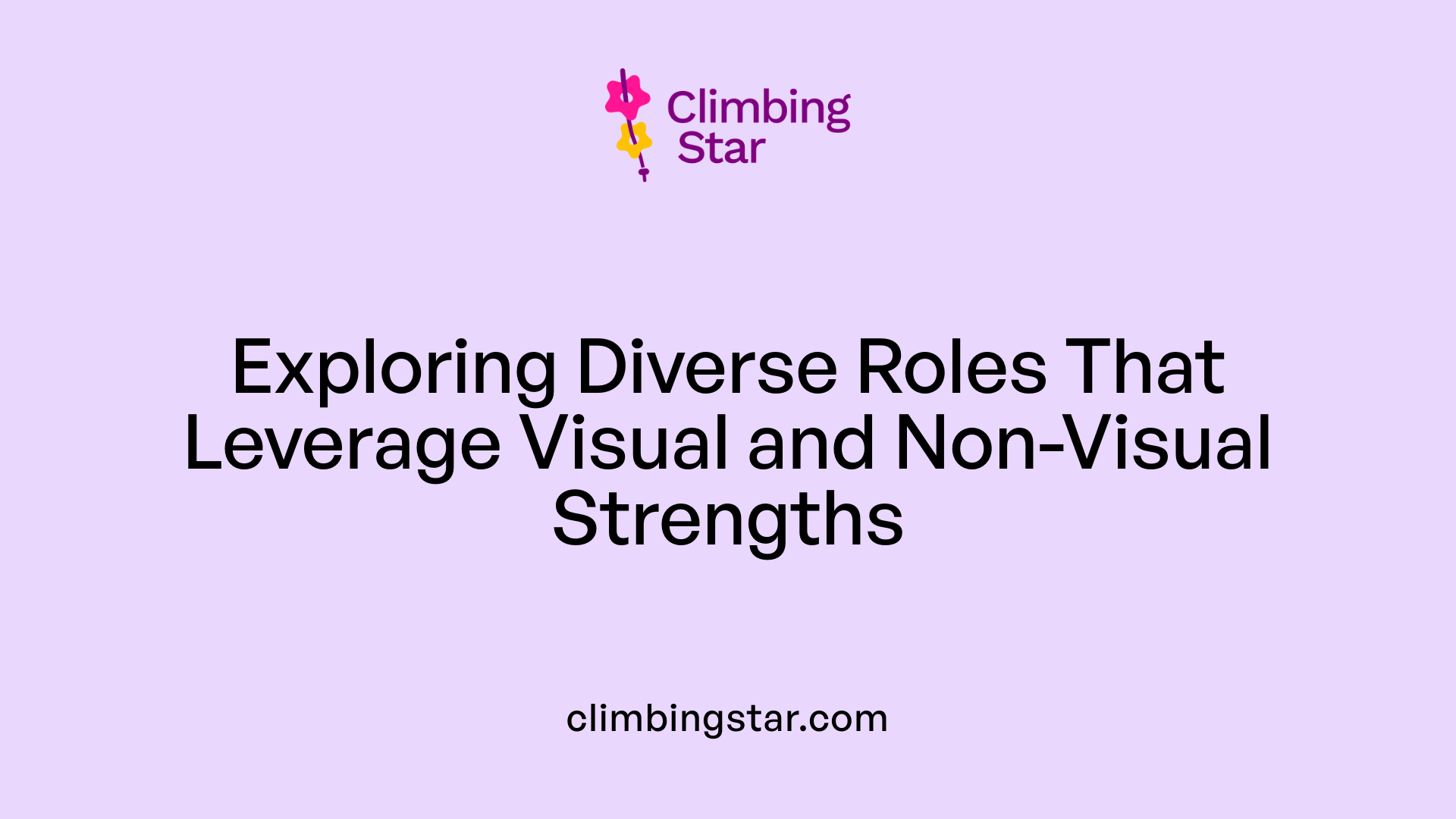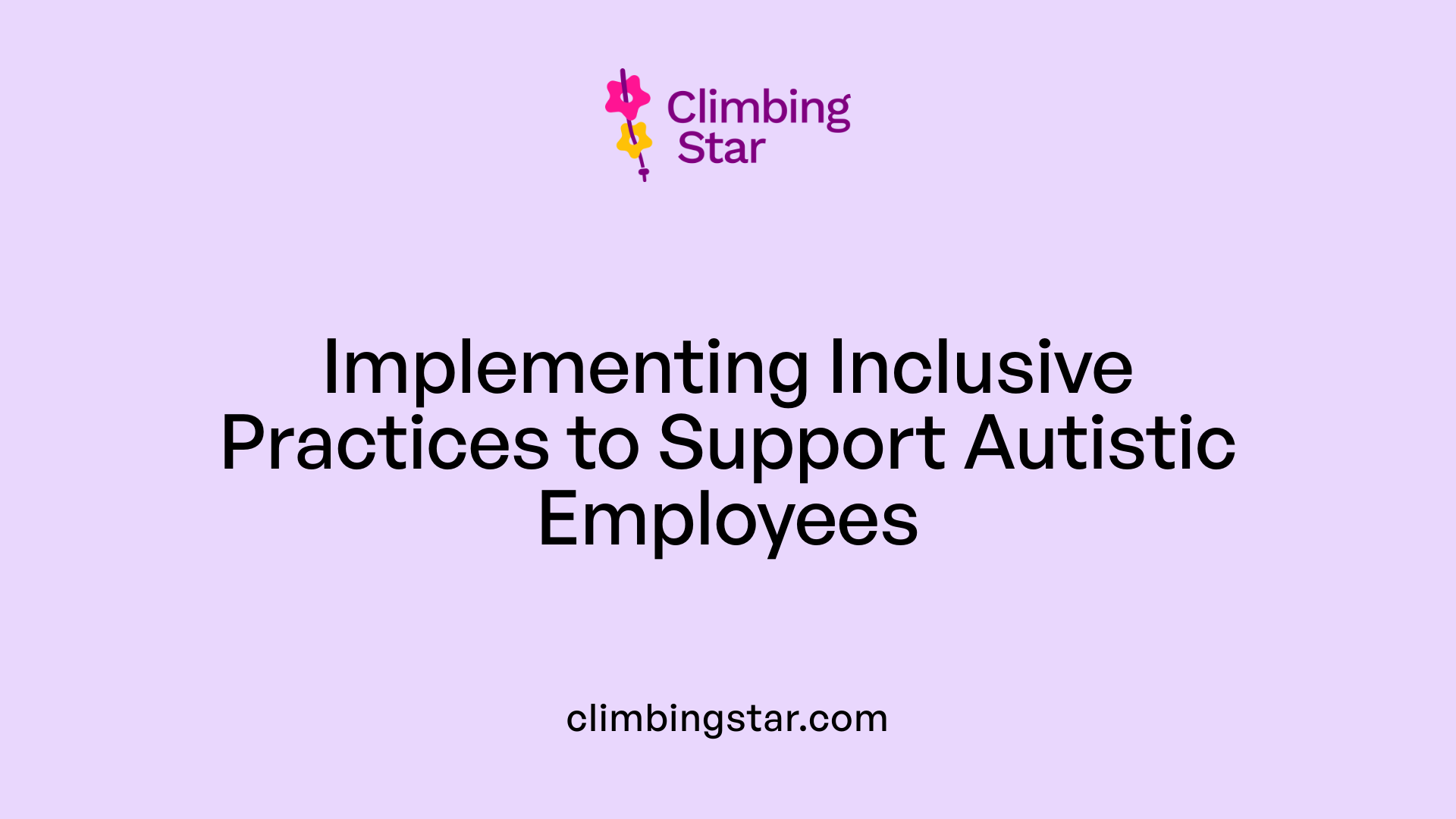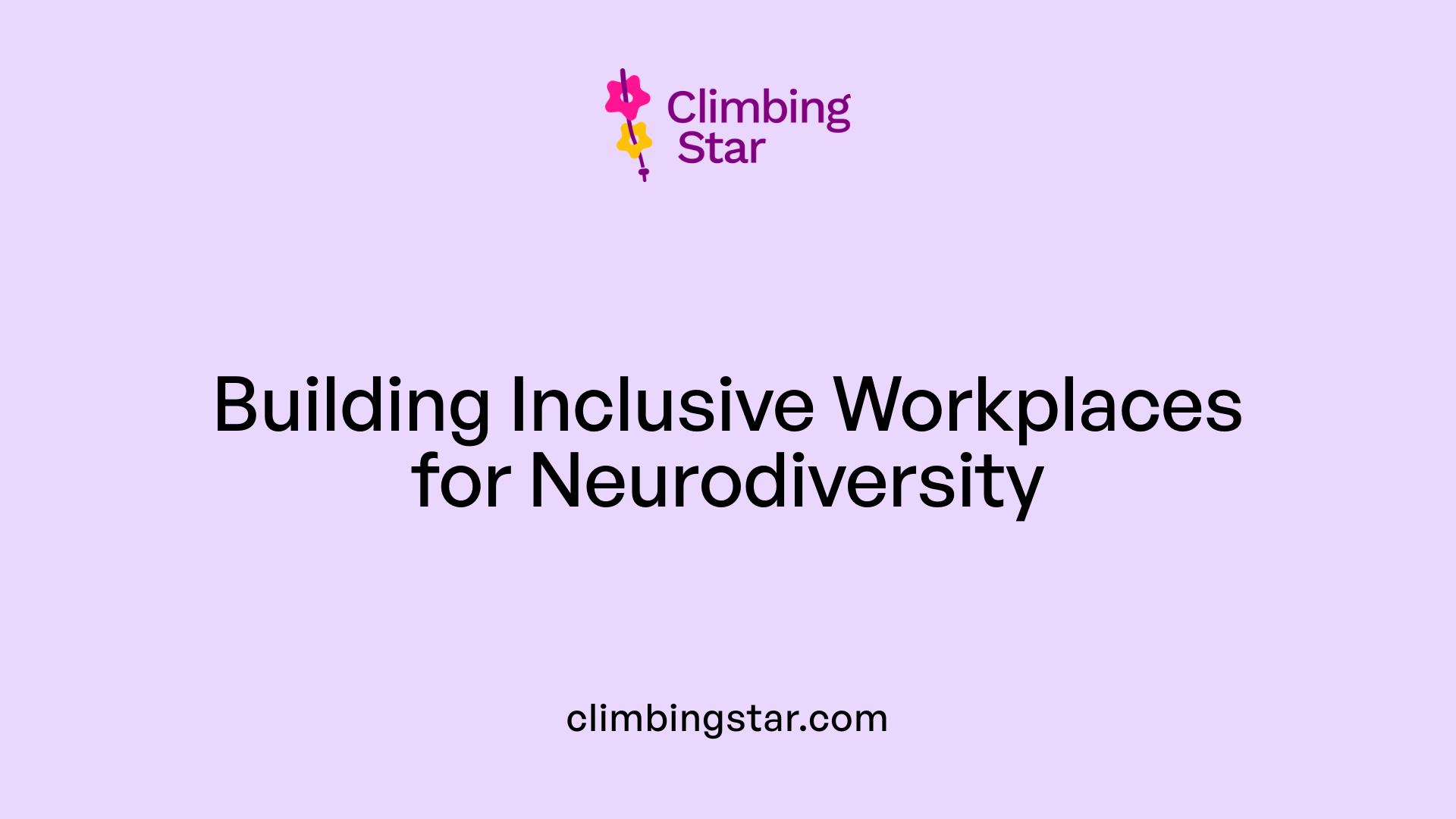Building Inclusive Pathways to Meaningful Employment for Autistic Individuals
Employment plays a crucial role in fostering independence, self-esteem, and community integration for autistic adults. Yet, many face barriers rooted in societal misconceptions and workplace challenges. This article explores suitable career options, available resources, and best practices to support autistic individuals in forging successful and fulfilling careers.
Identifying Suitable Career Paths for Autistic Adults

What are some suitable employment options and career paths for individuals on the autism spectrum?
Choosing the right career path for autistic adults depends largely on their unique strengths, interests, and abilities. Many find fulfilling work in roles that offer structure, clear goals, and opportunities to use their natural talents. Jobs that tap into visual thinking, such as computer programming, graphic design, or laboratory technology, are often well-suited for those with a strong visual orientation.
Roles in technology, like software testing, data analysis, or web page design, frequently require less reliance on short-term memory, making them accessible for many on the spectrum. Creative roles such as commercial art, photography, or handcrafted item production also provide productive outlets that match their strengths.
Numerous organizations, including Autism Speaks, the Autism Society, and Hire Autism, offer resources and programs to foster inclusive employment. Initiatives like Autism@Work and the Neurodiversity Career Connector help connect job seekers with employers committed to diversity and inclusion.
Federal efforts support integrated employment models, which emphasize real work experiences that respect autonomy, dignity, and accessibility. These programs aim to match individuals with jobs that meet their preferences and skillsets, often with accommodations tailored to individual needs.
Supporting autistic adults in their careers involves creating an environment that recognizes their diverse pathways. Tailoring jobs to align with their strengths, providing workplace supports, and teaching social and professional skills can boost employment success. Ultimately, the goal is to promote meaningful engagement and independence through roles that respect their abilities and aspirations.
Roles that utilize visual and analytical skills
| Job Role | Description | Suitable for | Additional Support Needed |
|---|---|---|---|
| Computer Programmer | Writing and troubleshooting code | Visual thinkers, detail-oriented | Adjustment of task complexity |
| Laboratory Technician | Conducting experiments and analyzing results | Analytical, precise | Technical training, clear instructions |
| Graphic Designer | Creating visual content for various media | Creative, visually skilled | Portfolio development, social skill support |
| Data Entry Specialist | Inputting and managing data with accuracy | Focused, organized | Clear instructions, routine tasks |
| Web Designer | Developing and maintaining websites | Tech-savvy, creative | Job coaching, software training |
Diverse pathways aligned with individual preferences
Career options are as varied as the individuals they serve. For those inclined toward hands-on crafts, jobs in manufacturing, small appliance repair, or building trades can be rewarding. For others, roles involving animal care, such as veterinary technician or pet training, align with their interests.
Furthermore, opportunities in supported employment models—such as integrated workplaces with peer support—enable individuals to thrive. Non-verbal roles like reshelving library books, warehouse work, or plant care provide avenues for those with limited verbal skills.
Programs and organizations are dedicated to expanding these pathways through training, community employment projects, and employment placement services. They help individuals identify their strengths, develop pertinent skills, and connect with employers that value diversity. By emphasizing tailored supports, structured goals, and recognition of social limitations, these careers foster not only employment but also personal growth and satisfaction.
A Spectrum of Opportunities: Roles Leveraging Visual and Non-Visual Strengths

What are some suitable employment options and career paths for individuals on the autism spectrum?
Employment opportunities for individuals on the autism spectrum are highly dependent on their unique strengths, interests, and capabilities. Many thrive in roles that involve structured tasks and clear expectations, especially in fields that tap into visual or analytical thinking.
For those with strong visual thinking skills, careers such as computer programming, graphic design, drafting, laboratory technology, and craftsmanship often align well with their abilities. These roles typically involve problem-solving, design, and precise execution, with less reliance on short-term working memory. Jobs like animal training, veterinary work, small appliance repair, and factory maintenance are also good options, especially for individuals interested in hands-on and technical tasks.
On the other hand, individuals with strengths in math, music, or factual knowledge might excel in roles such as accounting, engineering, data analysis, library science, journalism, and statistical work. These positions utilize analytical skills, precision, and attention to detail, making them suitable for those who prefer working with facts and structured information.
For nonverbal individuals or those with poor verbal skills, job options tend to be more technical or manual. Reshelving library books, factory assembly, data entry, warehouse work, and plant care provide accessible pathways that often do not require extensive communication skills.
Organizations like Autism Speaks, Autism Society, and Hire Autism are instrumental in promoting employment inclusion. They offer resources, programs such as Autism@Work, and the Neurodiversity Career Connector, which connect job seekers with employers committed to diverse hiring practices.
Government initiatives and employment programs focus on creating real, supportive work experiences—respecting dignity, accessibility, and acceptance. Supported employment and competitive jobs in inclusive environments are essential models that help autistic individuals thrive in their careers.
Additionally, tailored employment supports like workplace accommodations, social skills training, and career development resources improve job retention and satisfaction. Building a portfolio of work, practicing social and workplace skills, and expanding personal networks—especially through platforms like LinkedIn or specialized job sites—can further enhance employment prospects.
In summary, the landscape of employment for autistic individuals is broad and evolving. Choosing a career path that aligns with personal strengths, coupled with access to proper supports and inclusive workplace culture, can lead to rewarding and sustainable work lives.
Matching Job Roles to Skills and Limitations

How can employers match job types to the strengths and limitations of autistic individuals?
Employers can improve employment success for autistic individuals by first understanding their unique sensory preferences, communication styles, and interests. Conducting detailed assessments or creating personalized profiles helps identify what environments and tasks suit each person best.
For example, many autistic individuals excel in roles with structured routines, minimal sensory overload, and predictable tasks. Jobs such as data entry, laboratory work, programming, or technical writing often match these preferences well. Emphasizing clear instructions, consistent routines, and well-defined goals can foster a supportive workspace.
Accommodations play a crucial role. This may include adjusting lighting, reducing noise levels, or providing quiet work areas. Flexibility in scheduling also benefits many by catering to their energy levels and focus patterns.
Creating tailored job roles aligned with individual strengths and personal motivations encourages engagement. For instance, someone with a strong memory for facts might thrive as a library technician or research assistant. Others with interests in visual tasks could succeed in computer animation, graphic design, or equipment drafting.
Supportive environments are essential. Training managers on autism awareness, promoting inclusive policies, and offering ongoing job development facilitate long-term success. Establishing mentorship programs or peer support networks can also help autistic employees adapt and grow.
In conclusion, careful assessment and personalized adjustments—combined with a commitment to inclusion—help autistic individuals leverage their abilities while accommodating their limitations, leading to fulfilling and productive careers.
| Job Type | Suitable for | Support Strategies | Additional Notes |
|---|---|---|---|
| Data Entry | Attention to detail, routine | Noise reduction, clear instructions | Good for non-verbal or detail-oriented minds |
| Laboratory Technician | Scientific interests | Visual supports, structured tasks | Ideal for visual thinkers with focus on facts |
| Programming & Tech Roles | Logical thinking, pattern recognition | Flexible schedules, specific workspace accommodations | Suitable for those with strong analytical skills |
| Art & Design | Visual skills, creativity | Clear project scope, visual environment | Fits visual thinkers with art interests |
| Warehouse & Assembly | Pattern recognition, motor skills | Routine tasks, minimal social interaction | Suitable for non-verbal or less verbal individuals |
This tailored approach enhances job fit and satisfaction, fostering successful careers for autistic workers.
Empowering Employers with Inclusive Practices and Supports

What are best practices and support services to promote inclusive workplaces for autistic employees?
Creating an environment where autistic employees can thrive requires tailored practices and ongoing support. One of the most effective approaches is to establish sensory-friendly workplaces. This can include adding quiet zones or designated quiet rooms, adjusting lighting and reducing loud noises to cater to sensory sensitivities. Flexible work schedules and clear, straightforward communication methods help accommodate different social and cognitive needs.
Understanding neurodiversity is fundamental. Employers should invest in comprehensive training programs for staff and management that focus on awareness and acceptance of autism and other neurodiverse conditions. Cultivating a culture of respect and recognition transforms the workplace into an inclusive space rather than viewing autism as a problem to fix.
Implementing inclusive hiring practices also plays a crucial role. Skills-based assessments, structured interviews, and transparent recruitment processes ensure all candidates are evaluated fairly based on their abilities. These practices help reduce bias and provide equitable access to employment opportunities.
Support services extend beyond hiring. Mentorship programs, employee resource groups, and specialized counseling foster a supportive network within the organization. Regular feedback sessions and adjustments demonstrate that the organization values ongoing development and engagement.
Leadership commitment is vital. Embedding neuroinclusion principles into core organizational policies and values reinforces the importance of diversity. Companies that leverage the unique strengths of autistic employees—such as attention to detail, technical skills, and creative thinking—benefit from increased innovation and a more dynamic work environment.
In sum, successful inclusion involves creating sensory-compatible workspaces, educating staff, implementing fair hiring practices, and providing continuous support. These efforts promote not only productivity but also a sense of belonging, dignity, and fulfillment among autistic employees.
Success Stories: Celebrating Autistic Achievements in the Workforce
Are there success stories or testimonials from autistic individuals in employment?
Absolutely. There are numerous inspiring stories of autistic individuals excelling in their careers, demonstrating resilience, talent, and the positive impact of supportive work environments.
For example, Temple Grandin, a celebrated animal scientist and advocate, has revolutionized livestock handling and has become a prominent voice for neurodiversity. Her story showcases how leveraging her visual thinking and attention to detail has led to groundbreaking contributions in her field.
In the entertainment world, actress and autism advocate Daryl Hannah has spoken openly about her experiences, helping to raise awareness and foster acceptance.
Within the corporate sector, Michael, an employee at Boston Scientific, exemplifies how tailored accommodations—such as flexible work hours and a quiet workspace—can support long-term success for autistic workers. His experience underscores the importance of understanding and adjusting work environments to fit individual needs.
Another inspiring example is Jude, who faced challenges in traditional workplaces due to social and verbal communication difficulties. With the help of workplace support programs and reasonable adjustments, Jude has maintained meaningful employment, highlighting the importance of inclusive practices.
These stories illustrate that with the right support, understanding, and recognition of individual strengths, autistic people can thrive professionally. They are making significant contributions across diverse industries, from science and technology to arts and advocacy.
Supporting these achievements are organizations and initiatives that focus on creating inclusive employment environments. Programs like Autism Speaks’ Workplace Inclusion Now™, the Spectrum Careers platform, and supported employment models help connect autistic job seekers with suitable opportunities.
Furthermore, numerous success stories serve as motivation for employers to adopt more inclusive practices, fostering environments where every individual has the opportunity to succeed.
These narratives not only celebrate individual accomplishments but also highlight the importance of societal support and accessible work environments in unlocking the full potential of autistic individuals.
For further exploration, searching “Autistic success stories in the workplace” can reveal a wealth of personal journeys and professional milestones that motivate continuous progress toward inclusive employment.
Utilizing Resources and Programs to Enhance Employment Opportunities
Where can I find comprehensive directories and resources related to employment opportunities and training for autistic adults?
Finding the right support and opportunities is essential for autistic individuals aiming to join the workforce. Fortunately, numerous organizations and online platforms compile comprehensive directories and resources tailored for this purpose.
Reputable organizations such as Autism Speaks and the Autism Society provide extensive resources, including job search tools, success stories, and guides specifically designed for autistic adults. Autism Speaks has a dedicated Spectrum Careers website where job seekers can connect with inclusive employers and access employment tools. The Autism Society offers online guides, training, and best practices to help navigate employment challenges.
Programs like Hire Autism serve as job portals that link individuals on the spectrum with businesses actively seeking to create inclusive workplaces.
Government agencies also play a significant role. The U.S. Department of Labor hosts initiatives like the Employer Assistance and Resource Network and the Job Accommodation Network, which offer workplace accommodations and employer resources to foster inclusive employment environments.
Additionally, specialized programs such as Autism@Work, Delivering Jobs, and the Autism Employment Network focus on connecting autistic adults with leadership and employment opportunities. These platforms often feature success stories and legal support to empower job seekers.
Community-centered organizations like Specialisterne and Uniquely Abled Academy at GateWay Community College provide training, mentorship, and employment support specifically for autistic adults. Their programs help cultivate skills, build portfolios, and develop social skills crucial for workplace success.
In summary, accessing these directories and resources can significantly enhance employment prospects for autistic individuals. They not only provide vital information and tools but also foster connections with inclusive employers and support networks. Exploring these platforms is a proactive step toward meaningful employment and career growth.
The Path Forward: Advocacy, Awareness, and Building Inclusive Workplaces

What are best practices and support services to promote inclusive workplaces for autistic employees?
Creating inclusive workplaces for individuals on the autism spectrum requires thoughtful implementation of accommodations and support systems. Employers are encouraged to design sensory-friendly environments, such as providing quiet zones and reducing overwhelming stimuli, to help autistic employees perform at their best.
Flexible work schedules and clear, direct communication methods are essential to cater to varying needs and preferences. Training programs aimed at increasing awareness and understanding of neurodiversity foster a culture of acceptance and respect. This helps shift focus away from viewing autism as a problem, instead recognizing it as part of human diversity that can significantly contribute to organizational innovation.
In recruitment, skills-based assessments, structured interviews, and transparent processes help ensure equitable access to opportunities, reducing biases and barriers. Ongoing support services—like mentorship programs, employee resource groups, and specialized counseling—play a vital role in engaging and retaining autistic employees.
Leadership commitment is crucial for embedding neuroinclusion into the company's culture. Providing continuous training and resources increases staff awareness and equips managers to support diversity effectively. Additionally, leveraging the unique strengths of autistic individuals, such as visual thinking, attention to detail, or technical skills, can enhance overall team innovation.
In sum, a thriving, inclusive workplace is built on a combination of accommodating physical and social needs, fostering a culture of acceptance, and recognizing neurodiversity as an asset rather than a challenge. These practices promote not only employment equity but also organizational growth and adaptability.
How are organizations supporting employment for autistic individuals?
Organizations like Autism Speaks and AspireTech provide comprehensive resources including employment toolkits, training courses, and networking platforms designed specifically for autistic job seekers and employers. Programs such as 'Workplace Inclusion NowTM' facilitate dialogue between autistic workers and companies, helping to foster more supportive environments.
Support services extend from vocational training programs like those offered by JVS Career Center to nonprofit organizations such as Empowering Gardens, which focus on transitional employment and skill development. Companies like auticon US and Autism2Work specialize in creating roles aligned with autistic strengths, including remote work opportunities, data analysis, and software testing.
Furthermore, initiatives like the Spectrum Careers program connect individuals with autism to employers through partnerships, job portals, and community outreach. These programs emphasize individual strengths and interests, matching job roles accordingly.
In addition, federal resources such as vocational rehabilitation services and government-supported employment programs aim to provide necessary funding, coaching, and job placement assistance. Community initiatives focused on integrated employment promote meaningful work alongside colleagues without disabilities, fostering dignity, independence, and acceptance.
By combining policy-driven support, corporate initiatives, and community programs, the landscape for employment of autistic individuals is gradually becoming more inclusive and empowering.
What are the future directions for fostering inclusive employment environments?
Looking ahead, increasing public awareness about autism and neurodiversity is vital for reducing stigma and promoting acceptance in the workplace. Advocacy organizations continue to develop educational campaigns, online resources, and best practice guides to inform employers and employees alike.
Policy advancements are also expected to reinforce inclusive employment practices, including expanding legal protections, incentives for neuroinclusive hiring, and integrating autism awareness into broader diversity and inclusion initiatives.
Furthermore, expanding collaboration between government agencies, private sector, and nonprofit organizations can help develop innovative employment models such as supported employment and competitive employment, ensuring more autistic individuals have access to meaningful work.
Technology and remote work trends present additional opportunities to accommodate diverse needs, offering flexible, accessible options that can be tailored to individual preferences.
Ultimately, fostering truly inclusive workplaces depends on societal shifts toward accepting neurodiversity, continuous education, and persistent advocacy. This ongoing effort will cultivate environments where autistic individuals are valued, supported, and empowered to thrive professionally.
Championing Diversity: The Future of Autism Employment
Creating accessible, inclusive workplaces that recognize and harness the unique talents of autistic individuals is vital for building a diverse, innovative workforce. With ongoing support, tailored job opportunities, and inclusive practices, autistic adults can thrive professionally, contributing their valuable skills and perspectives. Collaboration among organizations, employers, policymakers, and communities is essential to break down barriers and foster a culture of acceptance and equality, paving the way for a brighter, more inclusive future in employment.
References
- Choosing the Right Job for People with Autism or Asperger's ...
- Employment Resources for Autism - Websites and Program
- Tips for autistic job seekers to find the right job
- Hire Autism- Finding Jobs And Talent Just Got Easier
- Employment and Training for Adults with Autism
- Employment Initiative
- Employment Resources for Autism - Websites and Program
- Job Resources for Individuals with Autism - Autism Research ...
- Employment Program | Spectrum Works | United States
- Hire Autism- Finding Jobs And Talent Just Got Easier






